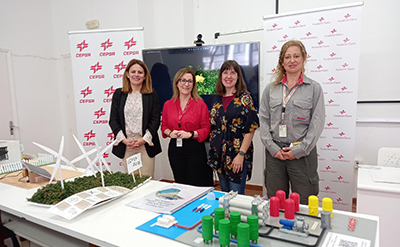- The Energy Campus is an educational program in which 1,816 students from 32 schools in Cadiz and Malaga have taken part
- The Madrevieja Environmental Station, which is celebrating its tenth anniversary of being open to the public this year, is the focal point of environmental education workshops for World Wetlands Day
- The students get a close look at the world of energy and learn the value of sustainability and protecting the environment
Thus, students Irene Ferrer, Carmen Morales, Víctor Martín and Clara Viñé from IES Santiago Ramón y Cajal de Fuengirola, have been declared winners in the group category of the Energy Campus project competition for their Green Hydrogen project. Second place was awarded to the group made up of Miguel Ángel Rodríguez and Ricardo Kaiser from IES Martín Rivero de Ronda, for their Electrolineras project. Meanwhile, María Ruiz, José Solís, María Pérez and Ainhoa Mateos won third plece for their project To innovate is to breathe at IES Mar del Sur in San Roque.
Second and third places for the individual category remain vacant, but Gerardo Torres from IES Virgen de la Esperanza de La Línea has won first place with his project Desalination Plant at the San Roque Energy Park.
As for the World Wetlands Day scholastic program, Fabián Barroso from the Tierno Galván school in Castellar de la Frontera won first prize in the Drawing category, while the top prize in the Photography category went to Sofía Cotorruelo from the Puertoblanco school in Algeciras. Second and third place in the Drawing Contest have been awarded to Ariadna Cantalejas from Reina Primary School in Jimena de la Frontera and Carla Pro from Tierno Galván. Jara Herráiz won second place in the Photography Contest, followed by Manuel Navarro, from the Puertoblanco School in Algeciras and Cristo Rey de San Pablo de Buceite Elementary School, respectively.
Members of the jury for Cepsa's Energy Campus and World Wetlands Day scholastic programs were Mónica Córdoba, Education councillor for the San Roque City Council; Environmental educator and teacher, as well as monitor of the Energy Campus program, Ana María Benítez; Cepsa professional, Palma Selva; and the head of Fundación Cepsa, Estrella Blanco.
Blanco stressed, "The value of these initiatives is academic and educational, there is no doubt about it. These programs help students to complement their education and learn more about the energy of today and the energy that is already becoming a reality, as well as the importance of conserving wetlands. But these awards also serve to highlight the excellent work of those students who have gone above and beyond in their studies and involvement in these programs."
The Energy Campus, a scholastic program aimed at students from the 2nd cycle of ESO, Baccalaureate, and Vocational Training, is focused on learning about subjects related to the world of energy and the energy transition. More than 1,800 students from 32 schools in Cadiz and Malaga participated in its ninth edition.
Meanwhile, the World Wetlands Day educational program, promoted by Fundación Cepsa, is aimed at elementary school students, coinciding with its namesake commemoration. Throughout the month of February, students go to the Madrevieja Environmental Station, a protected wetlands area, to learn more about the value and importance of this kind of natural space. This year, on the occasion of the tenth anniversary of its opening to the public, participation increased to 14 schools in Campo de Gibraltar, with 584 school children attending.




